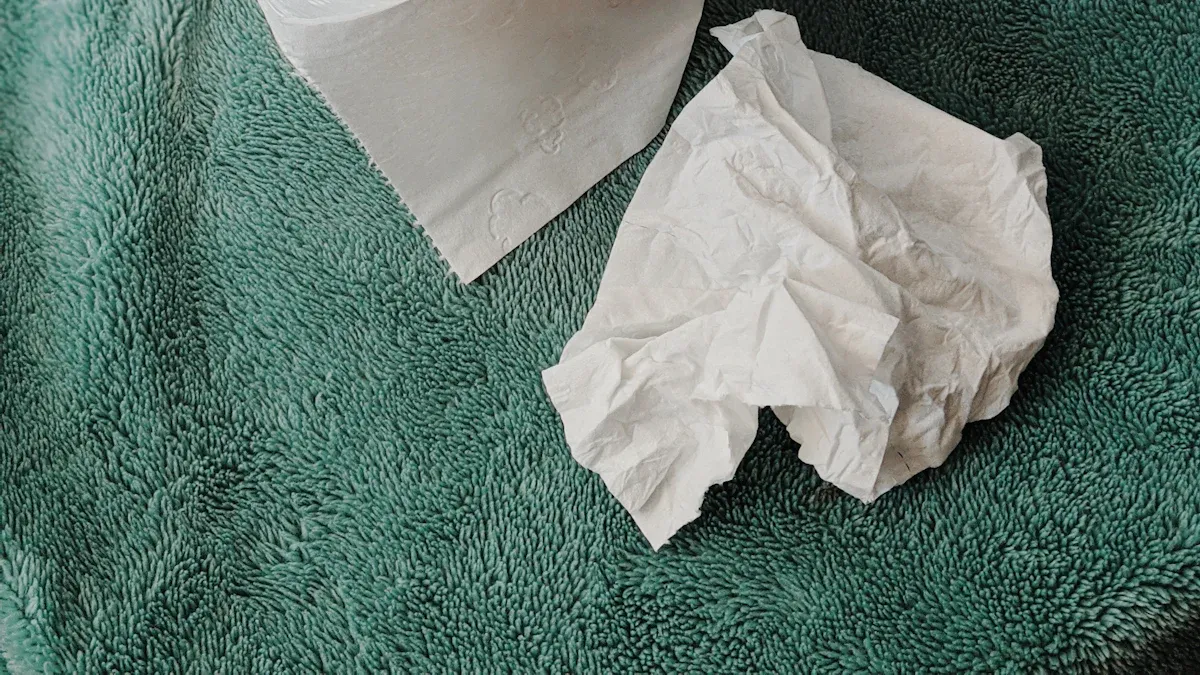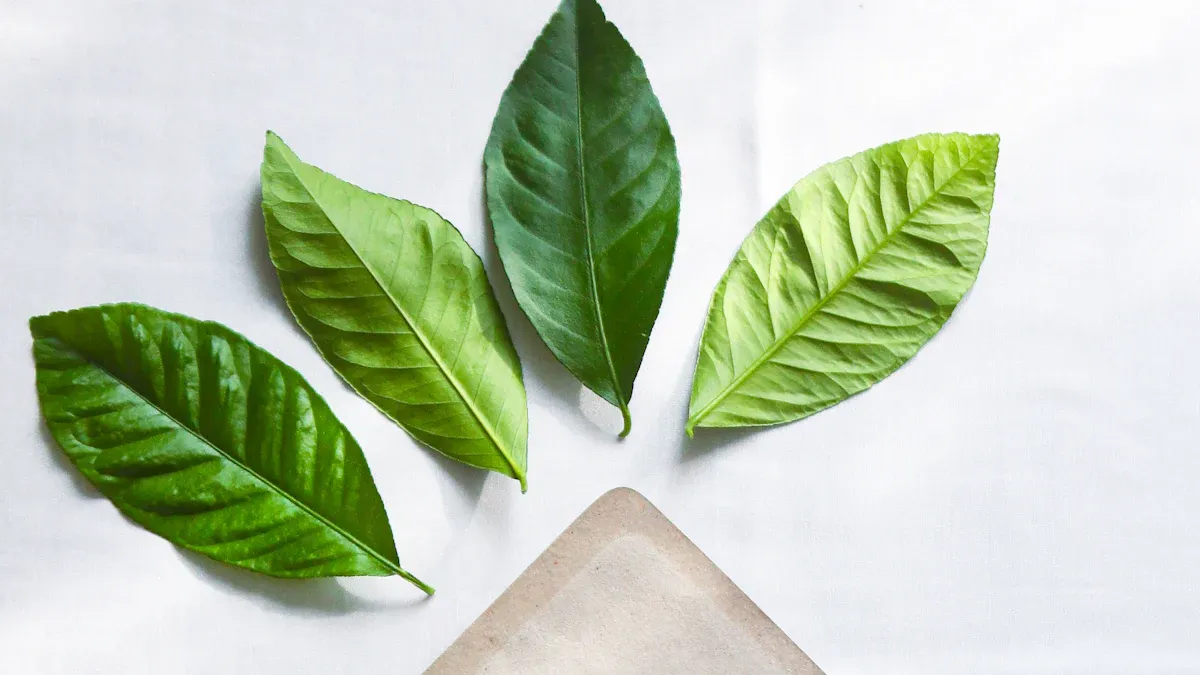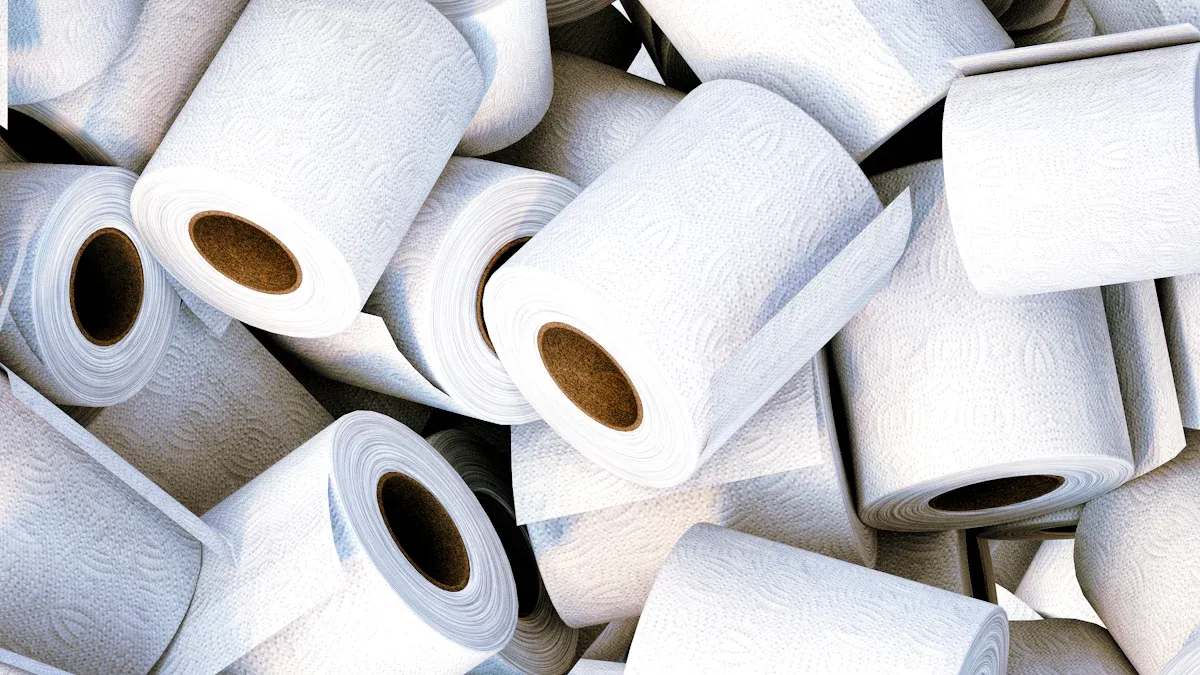
Choosing eco-friendly products like facial tissue mother roll virgin wood pulp jumbo tissue roll helps protect the planet. These rolls come from sustainably managed tree plantations, ensuring forests remain intact. They break down naturally, leaving no harmful waste behind. Unlike heavily processed alternatives, they use fewer chemicals, making them safer for the environment. Sustainable practices in sourcing and manufacturing are key to reducing environmental damage.
Every purchase matters. Supporting eco-friendly options like mother reels facial tissue jumbo roll helps combat deforestation and promotes greener living. By choosing face tissue jumbo roll and facial tissue paper, you contribute to a healthier planet for future generations.
Understanding Virgin Wood Pulp
What Is Virgin Wood Pulp
Virgin wood pulp comes directly from freshly harvested trees, making it a pure and unprocessed material. Unlike recycled pulp, it hasn’t been reused or mixed with other fibers. This purity ensures high-quality tissue rolls with superior softness and durability. The production process involves extracting cellulose fibers from wood, which are then treated to create strong and absorbent paper products.
The Kraft process is one of the most common methods for producing virgin wood pulp. It uses heat and pressure to dissolve lignin, resulting in long, high-quality fibers. This method yields over 95% of usable pulp, making it efficient and reliable for creating premium tissue rolls.
Differences Between Virgin, Recycled, and Mixed Pulp
Virgin wood pulp stands out for its strength and softness, which are essential for products like facial tissue mother roll virgin wood pulp jumbo tissue roll. Recycled pulp, on the other hand, comes from repurposed paper products. While it’s eco-friendly, it often lacks the durability and smooth texture of virgin pulp. Mixed pulp combines virgin and recycled fibers, offering a balance between quality and sustainability.
A comparison of pulp types highlights these differences:
| Pulp Type | Brightness (ISO) | Tensile Index | Absorbency Rate | Softness |
|---|---|---|---|---|
| Virgin Wood Pulp | High | Excellent | Superior | Premium |
| Recycled Pulp | Moderate | Lower | Adequate | Basic |
| Mixed Pulp | Variable | Balanced | Moderate | Average |
Why Virgin Wood Pulp Is Preferred for Facial Tissue Mother Roll Virgin Wood Pulp Jumbo Tissue Roll
Consumers often choose virgin wood pulp for its unmatched softness and strength. These qualities make it ideal for facial tissue mother roll virgin wood pulp jumbo tissue roll, where comfort and durability are key. In regions where luxury hygiene products are in demand, virgin pulp-based tissues dominate the market.
Additionally, virgin wood pulp ensures consistent quality, which is crucial for jumbo tissue rolls used in high-volume applications. While recycled fibers are gaining popularity for their environmental benefits, virgin pulp remains the top choice for premium tissue products.
Eco-Friendly Features of Virgin Wood Pulp Tissue Rolls

Sustainable Forestry Practices
Virgin wood pulp tissue rolls rely on trees from responsibly managed forests. Sustainable forestry practices ensure that trees are replanted after harvesting, maintaining a balance between production and environmental preservation. These practices protect biodiversity and prevent deforestation, which is crucial for wildlife habitats.
For example, clearcutting for virgin fiber can harm ecosystems, affecting species like caribou. However, sustainable sourcing minimizes such ecological damage. Companies that prioritize responsible forestry help reduce carbon emissions and preserve natural resources for future generations.
| Evidence Type | Description |
|---|---|
| Carbon Emissions | Virgin fiber toilet paper creates three times the carbon emissions compared to 100% recycled content. |
| Bleaching Process | The production of virgin fiber requires a caustic bleaching process that pollutes waterways and air. |
| Ecological Damage | Clearcutting for virgin fiber leads to permanent damage to forests, affecting biodiversity and wildlife. |
Certifications to Look For (e.g., FSC, PEFC)
Certifications play a vital role in identifying eco-friendly tissue rolls. Look for labels like the Forest Stewardship Council (FSC) and the Programme for the Endorsement of Forest Certification (PEFC). These certifications ensure that the wood pulp comes from forests managed with sustainability in mind.
Here are some key certifications and guidelines:
- Forest Stewardship Council (FSC): Ensures sustainable forestry practices and credible sustainability requirements.
- Programme for the Endorsement of Forest Certification (PEFC): Promotes sustainable forest management globally.
- Publisher’s Database for Responsible Environmental Paper Sourcing (PREPS): Tracks responsible sourcing of pulp and paper.
- Consumer Goods Forum Guidelines: Helps companies avoid controversial sources contributing to deforestation.
FSC certification, established in 1993, covers 160 million hectares of forest and involves over 63,000 certifications worldwide. PEFC, founded in 1999, certifies 295 million hectares and works with 20,000 companies. These certifications provide transparency and accountability, helping consumers make informed choices.
| Certification | Year Established | Certified Area (Hectares) | Number of Certifications | Companies with Certification |
|---|---|---|---|---|
| FSC | 1993 | 160 million | 63,000 | 1,700 |
| PEFC | 1999 | 295 million | N/A | 20,000 |
Minimal Chemical Processing
Virgin wood pulp tissue rolls undergo minimal chemical processing compared to other types of tissue products. The production process avoids excessive bleaching and harsh chemicals, which can harm the environment. By reducing the use of caustic substances, manufacturers lower the risk of water and air pollution.
This approach also ensures that the tissue rolls are safer for consumers. Products like facial tissue mother roll virgin wood pulp jumbo tissue roll maintain their natural softness and strength without relying on heavy chemical treatments. Choosing minimally processed tissue rolls supports cleaner production methods and reduces the overall environmental impact.
Biodegradability and Environmental Benefits
One of the standout features of virgin wood pulp tissue rolls is their biodegradability. These products break down naturally, leaving no harmful waste behind. Unlike synthetic materials, they decompose quickly, making them an eco-friendly choice for households and businesses.
Biodegradable tissue rolls also contribute to waste reduction. When disposed of properly, they return to the earth without polluting the environment. This makes products like facial tissue mother roll virgin wood pulp jumbo tissue roll a sustainable option for those looking to minimize their ecological footprint.
By choosing biodegradable tissue rolls, consumers can actively support a cleaner planet. Every small step, like opting for eco-friendly products, helps create a healthier environment for future generations.
Production and Environmental Impact

Energy-Efficient Manufacturing Processes
Manufacturing virgin wood pulp tissue rolls has evolved to become more energy-efficient. Many companies now use advanced technologies to reduce energy consumption during production. For instance, modern machinery optimizes the Kraft process, which extracts cellulose fibers from wood. This approach minimizes waste and maximizes usable pulp, making the process more sustainable.
Energy-efficient practices also include using renewable energy sources like biomass and hydropower. These alternatives lower dependence on fossil fuels, reducing greenhouse gas emissions. By adopting such methods, manufacturers contribute to cleaner production cycles.
The European paper industry demonstrates the reliance on virgin wood pulp, with 42% of its materials sourced from fresh fibers. However, studies show that wood Kraft pulp production generates significant emissions to water and air. While these impacts are notable, ongoing innovations aim to mitigate environmental harm, ensuring a greener future for tissue roll production.
Water Conservation in Production
Water conservation plays a vital role in producing virgin wood pulp tissue rolls. The pulp and paper industry has made significant strides in reducing water usage over the years.
- Up to 70 m³ of wastewater is generated for every metric ton of paper produced.
- Around 70% of the water intake is used as process water.
- Over the past 30 years, water consumption per ton of paper has dropped by 95%.
These improvements reflect the industry’s commitment to sustainability. Manufacturers now recycle process water and implement closed-loop systems to minimize waste. Such practices not only conserve water but also reduce pollution, making production more eco-friendly.
Reducing Carbon Footprint in the Supply Chain
Reducing the carbon footprint in the supply chain is another critical aspect of virgin wood pulp tissue roll production. Companies focus on sourcing raw materials locally to cut transportation emissions. Efficient logistics systems further streamline the movement of goods, lowering fuel consumption.
Switching to renewable energy in manufacturing facilities also helps reduce carbon emissions. Some manufacturers use solar panels or wind turbines to power their operations. These efforts align with global goals to combat climate change and promote sustainable practices.
By prioritizing energy efficiency, water conservation, and carbon reduction, the virgin wood pulp tissue roll industry is paving the way for a more sustainable future. Every step in the production process reflects a commitment to protecting the planet while delivering high-quality products.
Consumer Tips for Eco-Friendly Choices
How to Identify Eco-Friendly Tissue Rolls
Choosing eco-friendly tissue rolls doesn’t have to be complicated. Consumers can look for specific qualities that indicate sustainability and high quality. Here are some tips to help identify the best options:
- Tissue rolls made from virgin wood pulp often feel soft and fine due to their high wood pulp content.
- Good-quality tissue paper shows wrinkles when pulled but doesn’t tear easily.
- Avoid products with excessive fluorescent agents. When burned, these tissues produce white or black ash, unlike eco-friendly ones that burn to natural gray ash.
- High density and toughness are signs of premium tissue rolls. Even when wet, they remain intact and durable.
By paying attention to these characteristics, shoppers can make informed choices that benefit both their households and the environment.
Importance of Certifications and Labels
Certifications and labels are essential for identifying eco-friendly tissue rolls. They provide transparency and ensure that products meet sustainability standards. Consumers should look for the following certifications:
| Certification | Description |
|---|---|
| PEFC | Certifies forests and ensures sustainable wood production. |
| Chain of Custody | Traces product path from certified forests through the supply chain. |
Additionally, the Forest Stewardship Council (FSC) label is widely recognized. Studies show that 77% of consumers prefer FSC-certified products. Independent certifications also build trust, with 76% of global shoppers believing sustainability credentials should be verified by third parties.
Eco-friendly packaging is another indicator. Research reveals that 59% of consumers in the US and UK are willing to pay more for products with sustainable packaging. These certifications and labels make it easier to choose tissue rolls that align with environmental values.
Avoiding Over-Bleached or Heavily Processed Products
Over-bleaching and heavy processing can harm both the environment and the quality of tissue rolls. Consumers should avoid products that rely on excessive chemical treatments. These processes often pollute waterways and air, leaving a larger ecological footprint.
Instead, opt for minimally processed tissue rolls. Virgin wood pulp tissue rolls, for example, undergo fewer chemical treatments, preserving their natural softness and strength. Tissue rolls with less bleaching are also safer for everyday use, as they contain fewer harmful residues.
By choosing products with minimal processing, consumers can reduce their exposure to chemicals while supporting cleaner manufacturing practices.
Supporting Brands with Transparent Sustainability Practices
Brands that prioritize sustainability deserve consumer support. Transparency in sourcing, production, and packaging reflects a commitment to protecting the planet. Companies that use recycled materials or alternative fibers like bamboo and wheat straw often lead the way in eco-friendly practices.
The NRDC scorecard is a helpful tool for evaluating tissue brands. It highlights the environmental impact of products, showing that recycled paper and alternative materials have a lower carbon footprint. Recycled toilet paper, for instance, eliminates deforestation, uses half the water compared to virgin pulp production, and reduces air pollution.
Consumers can also look for brands that openly share their sustainability initiatives. Supporting these companies encourages responsible practices and helps create a greener future.
Virgin wood pulp tissue rolls stand out for their eco-friendly features. They come from sustainably managed forests, break down naturally, and use fewer chemicals during production.
Choosing these products helps protect the planet. Supporting brands with transparent sustainability practices ensures a greener future. Every purchase makes a difference—opt for eco-conscious options today!
FAQ
What makes virgin wood pulp tissue rolls better than recycled ones?
Virgin wood pulp tissue rolls offer superior softness, strength, and durability. They’re perfect for premium products like facial tissues, ensuring comfort and quality every time.
Are virgin wood pulp tissue rolls biodegradable?
Yes! Virgin wood pulp tissue rolls decompose naturally, leaving no harmful waste. They’re an eco-friendly choice for reducing environmental impact.
How can consumers identify eco-friendly tissue rolls?
Look for certifications like FSC or PEFC. Check for minimal chemical processing, natural softness, and labels indicating sustainable sourcing.
Tip: Avoid over-bleached products for a greener choice!
Post time: Jun-10-2025
